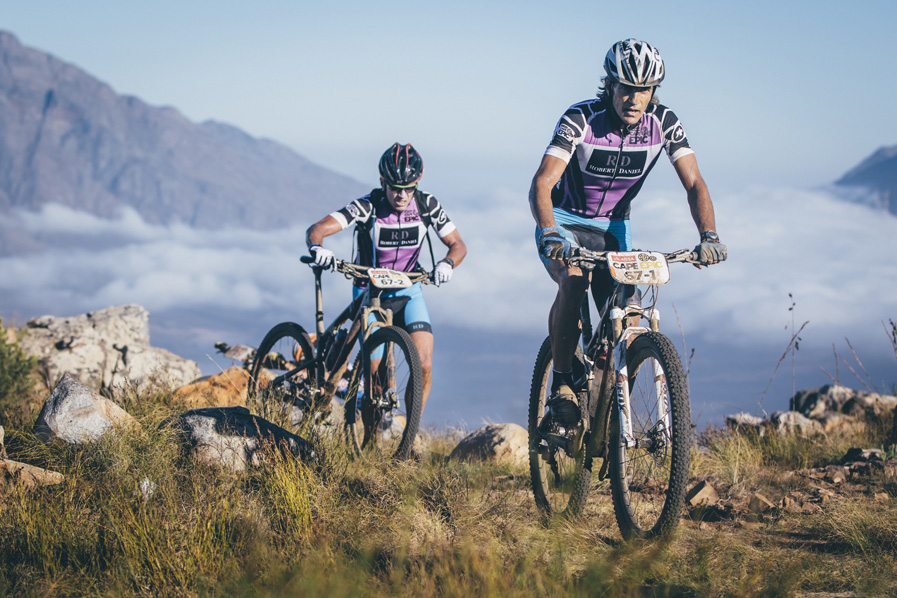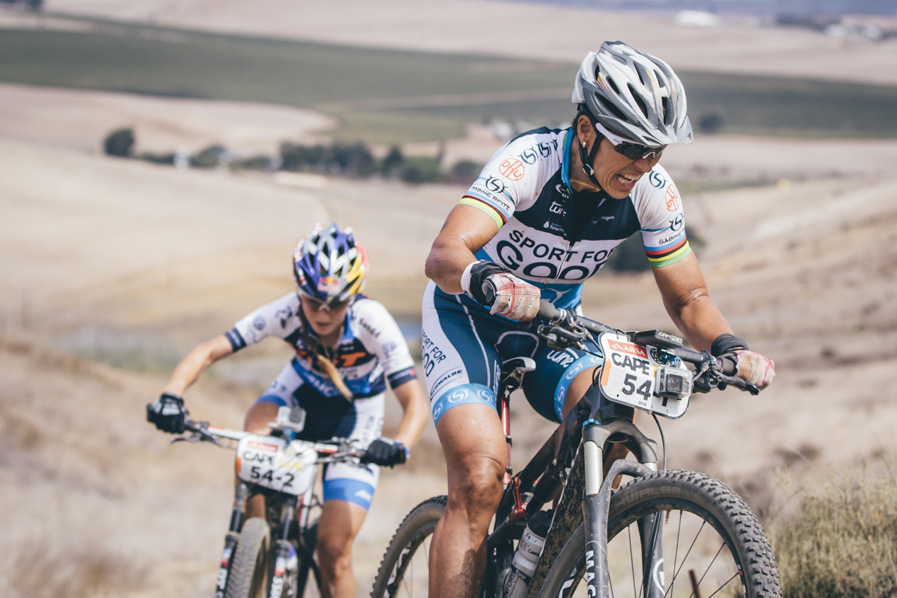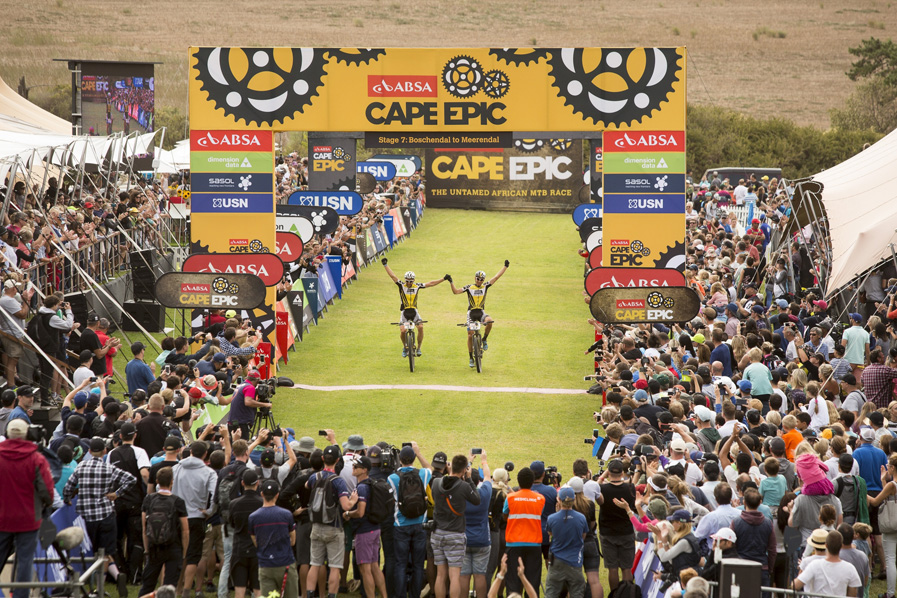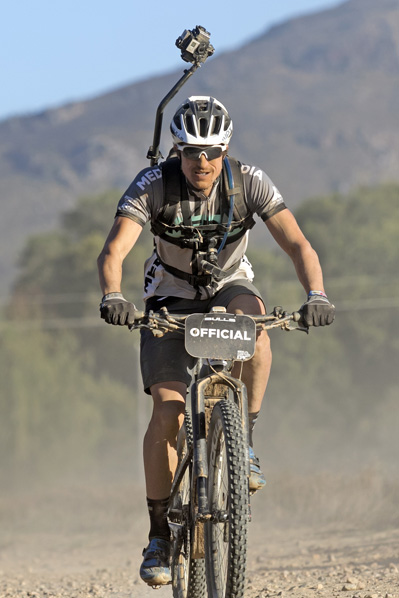Karl Platt wins No. 5
We called it in our preview, but it’s still an incredible achievement. The German champion Karl Platt won his fifth Cape Epic title, matching the record set in 2015 by Swiss star, Christoph Sauser. While Sauser holds the record for Stage wins (36), Platt’s Cape Epic legacy is hard to beat.
He won the first edition in 2004 (with Namibian teammate Mannie Heymans) and has started all 13 Cape Epics. He was forced to withdraw from the 2014 edition with an injury, spoiling an otherwise perfect start/finish record.

Photo by Shaun Roy/Cape Epic/SPORTZPICS
He won his second, third and fourth titles with compatriot, Stefan Sahm and collected the 2016 win with Swiss teammate, Urs Huber. Platt and Huber won three stages, taking Platt’s total to 17. Their winning margin was just over 13 minutes. That’s quite a dominant victory and begs the question: Can Platt become the first man to win six Cape Epics? At 37 he says he’s still got the desire and his performance seems to have improved in the past year. Roll on 2017…
The route is king
Often criticised for having a too many gravel roads, or unrealistic traverses, the Cape Epic route is always a topic of discussion. This is a good thing because it’s an event that changes its route each year. The 2016 route designers can be proud. They opted for a shorter, more technical route with more singletrack than ever before and we feel it was the most complete mountain biking test of any of the race’s editions. Shorter doesn’t mean easier. In fact, shorter means more intense. Intensity results in pressure and makes racing less predictable. Yes, the 2016 route was a cracker and we hope future editions will be similar. We’ve expanded more comprehensively on this point here CAPE EPIC: DON’T BLAME THE ROUTE, BRU. HTFU!
So many novices!
We found ourselves doing a lot of research during this year’s Cape Epic. A number of unfamiliar names were finishing on the stage podiums. In fact eight riders in the top 16 teams overall were novices and two riders in the top three teams in the women’s race were also novices. Sure, there were a few regulars missing, such as Schurter, Paulissen, Hermida and Buys, but it was refreshing to see a new crop of riders finding inspiration and success at the world’s most prestigious mountain bike stage races. We see most of those riders are back for 2017. No longer novices, they’ll sure add to the intensity of the podium battles. Roll on 19 March!

Photo by Nick Muzik/Cape Epic/SPORTZPICS
Rob Sim’s first win
Cape Town businessman, Robert Sim, finally claimed his first Cape Epic title when he and German teammate Udo Böelts, snapped up the victory in the Grand Masters division. Since 2010, Sim has been an age-category title contender, coming painfully close to a win on more than one occasion.
In 2010, he and teammate Corrie Muller were third in the Masters. In 2011, partnered with Doug Brown, Sim went one better with a runner-up finish in the Masters. In 2012, while holding a commanding lead, Sim saw his hopes of a win disappear when teammate, Nico Pfitzenmaier, was forced to withdraw after crashing out with an injury.

Photo by Ewald Sadie/Cape Epic/SPORTZPICSag
Sim was then second again in 2013 with Dutch teammate, Bart Brentjens and then second yet again in 2015 teamed up again with Pfitzenmaier. A Master’s win evaded Sim, but at his first attempt in the Grand Master division, he claimed his long-wanted Cape Epic win. He was the only South African to win a Cape Epic title in 2016.
The Grand Masters (50-years and over) category was introduced in 2013 and has produced some inspirational racing as the ‘old guys’ confirm that age is just a bloody number…
2013: Barti Bucher/Heinz Zoerweg (26th overall)
2014: Andrew McLean/Heinz Zoerweg (15th overall)
2015: Barti Bucher/Heinz Zoerweg (29th overall)
2016: Robert Sim/Udo Böelts (25th overall)
Bart and Abreo’s third win
With approximately a third of the total teams in the 40-49-year range, the Masters division at the Cape Epic has significant depth and is extremely competitive. It’s a blend of mid-life-crisis sufferers, successful businessmen, former professional bicycle racers, ex-rugby players and adventurous souls who recently discovered mountain biking and just can’t get enough.
The top two teams are usually in the top 20 overall in the daily and final results. That’s impressive. There’s a seriously competitive spirit in the Masters and it’s quite an achievement to win the Masters title.
Brazilian Abraao Azevedo claimed his fourth successive Master’s title this year. Four in a row is a feat unmatched in this division and a show of impressive consistency. Azevedo has won the last three with Dutchman Bart Brentjens, who himself became a five-time Cape Epic winner this year. His three successive Master’s titles with Azevedo come after his first Master’s win with Jan Weevers in 2012. But of course his biggest win was the overall title in 2005 with Belgian Röel Paulissen. This will always be a popular category at the Cape Epic. It would be great to see more focus on it in terms of media coverage. Maybe some back stories on the top performers, or the most consistent performers. Many of them hold down full time jobs and still make time to be in the condition for podium contention.
2004: Frank Soll/Duncan English
2005: Fred Coleske/Doug Brown
2006: Linus van Onselen/Geddan Ruddock
2007: Andrew McLean/Damian Booth
2008: Barti Bucher/Doug Brown
2009: Barti Bucher/Doug Brown
2010: Andrew McLean/Shan Wilson
2011: Carsten Bresser/Udo Boelts
2012: Bart Brentjens/Jan Weevers
2013: Nico Pfitzenmaier/Abraao Azevedo
2014: Bart Brentjens/Abraao Azevedo
2015: Bart Brentjens/Abraao Azevedo
2016: Bart Brentjens/Abraao Azevedo
The Women’s Race is a real race
For the first time, the Cape Epic separated the women’s race start and it resulted in the most exciting women’s contest yet. In 2015, Norway’s Gunn-Rita Dahle Flesjaa competed in her first Cape Epic. While she was unable to finish due to her teammate falling ill, she rode enough of the race to offer constructive criticism, which the organisers paid close attention to. The sport’s most decorated female racer felt that a separate women’s start would even up the race somewhat. She was right. While Annika Langvad and Ariane Kleinhans claimed their third successive title, they had to fight harder than before for the crown. Their winning margin over Yana Belomoina (UKR) and Sabine Spitz (GER) was 14 minutes 56 seconds; with Sally Bigham (GBR) and Adel Morath (GER) taking third place 20 minutes 42 seconds back. It was by far the closest women’s race in the event’s history and bodes well for the category, which has struggled in some circles to justify having equal prize money to the men.

Photo by Ewald Sadie/Cape Epic/SPORTZPICS
Annika and Ariane’s third win
Annika Langvad and Ariane Kleinhans became the first women to win three Cape Epic titles when they captured their third successive trophy in a tight contest. They’ve helped transform the women’s race into a purely professional affair with their focus and execution and the significant support from their sponsors.
The equal prize money has also had an effect on the women’s race, with more full-time pro’s making the trip from abroad in search of cash and UCI ranking points. Until their winning streak began, only Hanlie Booyens, Sharon Laws and Sally Bigham had won more than once, with Bigham the only rider to have been able to win in successive years.
2004: Hanlie Booyens/Sharon Laws
2005: Zoe Frost/Hannele Steyn
2006: Sabine Grona/Kirsten Brachtendorf
2007: Anke Moore/Yolande de Villiers
2008: Pia Sundstedt/Alison Sydor
2009: Hanlie Booyens/Sharon Laws
2010: Kristine Noergaard/Anna-Sofie Noergaard
2011: Sally Bigham/Karien van Jaarsveld
2012: Sally Bigham/Esther Suss
2013: Yolande Speedy/Catherine Williamson
2014: Anika Langvad/Ariane Kleinhans
2015: Anika Langvad/Ariane Kleinhans
2016: Anika Langvad/Ariane Kleinhans
Meerendal x2
Meerendal has become a favoured venue of the Cape Epic since 2012. The wine estate boasts a trail network that’s been highly developed and it offers some incredible views of the winelands and of Table Mountain. It’s short hop from Cape Town and the owner, Herman Coertze, has invested heavily in mountain biking in general and the Cape Epic in particular. It’s become the regular finish venue of late, but in 2016 was also the venue for the opening prologue time trial – at short notice. Two weeks before the race, there were incidents of violence at the University of Cape Town, the original start venue. The organisers decided to avoid any potential drama and moved the prologue to Meerendal from the slopes of Table Mountain.
There were some that criticised this decision, but ultimately, the safety of the participants and spectators is the responsibility of the organisers. That there would have been live TV coverage of the prologue at UCT would have been a sure magnet for the protesting parties, which could well have changed the race’s start from a sports story to a news story. We reckon the decision was the correct one.

Photo by Sam Clark/Cape Epic/SPORTZPICSa
Kevin Vermaak’s first Epic
It took 13 years for Cape Epic founder, Kevin Vermaak, to compete in his first Cape Epic. He rode with long-time friend Jakes Jakobsen and they completed the race in 182nd position in a total time of 41 hours and 4 minutes. Say what you like about Vermaak, he not only created the world’s most prestigious mountain bike stage race, he helped transform South African mountain biking from a fringe cycling discipline to one of the most popular participant sports in the country. Stage-racing, inspired primarily by the Cape Epic, occupies a large part of the market. It’s developed into a micro-industry on its own with at least 70 stage races on the South African calendar. The cumulative racing days of those 70-plus events means that there’s mountain bike racing on more than 365 days in a year. That’s quite a feat and somewhat unique to South Africa. While the Cape Epic isn’t the first South African stage race (that’s belongs to the two-day To Hell and Back), it is the one that inspired a nation to want to become mountain bikers.
We liked the name of Vermaak and Jakobson’s team, ‘Finally…’ It was great to see Vermaak on a bike, in his event, smiling. Well played sir. We hope you enjoy many more – from a saddle.
Media – next level
When you’re the first of your kind in anything, innovation becomes part of your character. The Cape Epic is one of those events whose character is rich in innovation. This year was no different, especially from a media perspective. There was daily livestreaming online coverage, in addition to the now customary live TV footage of the first and last days. Livestreaming is sure way to feel connected to an event, no matter where you are in the world. It’s not necessarily new to stage races, but professional execution of it varies significantly. The Cape Epic upped the bar somewhat in that respect, even though there was the occasional glitch, which will no doubt be smoothed out for 2017.
Another Cape Epic innovation was the roving bicycle camera. Piloted by former three-time Cape Epic winner, Stefan Sahm, using an e-Bike, the roving ‘from the saddle’ camera gave viewers a rider’s perspective of the racing action. Which was pretty cool. However, the photographers and film crews came to be annoyed at times with Sahm as he and his protruding point-of-view camera often spoiled a great racing shot.

Photo by Mark Sampson/Cape Epic/SPORTZPICS

All rights reserved.


